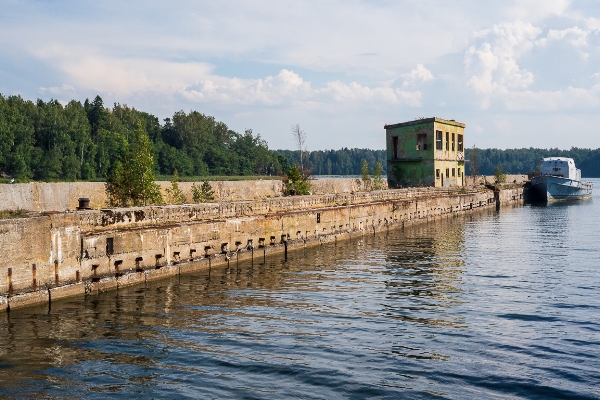July 17, 2018
The secret Russian submarine base, according to the guide, is ‘on the coast – down a little track that says there is CCTV.’ How enticing. I don’t know about you but I love a little secret, the thrill of gaining privileged information, the responsibility of keeping it.
Parking is on a rough patch of gravel scattered over the verge. A portacabin is perched next to a barrier. The Estonian lady who emerges is neat, attractive and all smiles. She speaks perfect English and her patter is well-rehearsed. She would excel at selling Audis to Brexiteers in Sunderland.
“We bought the land last year,” she explains. “We have plans to turn the area into a holiday destination with cabins and water sports.”
“How long will it take? 5 years? 10?”
“We are already opening a new part in September. 5 years maximum.”
It is 5 euros to reveal the secret. I can’t say I’m not disappointed. I should know by now that there’s always a price. Part of me admires this entrepreneurship and part of me is saddened by the thought of what will transpire. A country occupied by first one extreme regime (the Nazis) then another (the Russians) should be careful to choose its master. I, of course, wish them well. I hope they are not dazzled by the glittering rewards promised by the kind of pernicious greed that currently bedevils the UK (like paying to park the car in publicly owned parks – a regressive tax on health-benefitting activities).
The coastline here, less than an hour from Tallin, forms a kind of V. During occupation of Estonia, the Russians publicly acknowledged bases at the two tops of the V. The bottom of the V hid a third. It was undetectable by radar and in its prime, scores of Naval personnel were secretly shipped in daily.
Not much remains. Grey concrete. Rusted iron. Decay. Graffiti. The rotting structures before me are almost directly geographically opposite those of Kruunuvuori and they could not be more contrary. There is no sense of lost ethereal splendour, no mourning of some fallen crown. Military architecture is brutal, stark, and purely functional. There is little aesthetic beauty to be found here. But there is something compelling. Something cerebral, perhaps, that speaks more to the head than the heart. Something grand and conceptual. The idea that War itself lost, that Time has eroded man’s most destructive creations, and that secrets are impermanent, that Truth will prevail.










